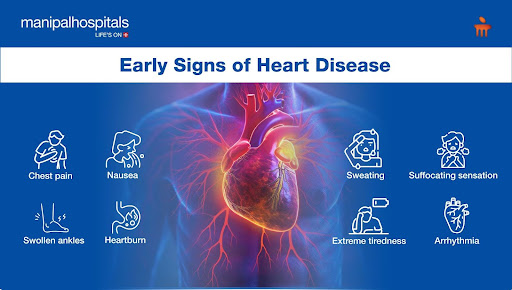Heart disease is a prevalent and life-threatening condition that impacts millions of individuals worldwide. This disease has emerged as the leading cause of death globally, affecting everyone irrespective of age and gender. Alarmingly, heart diseases account for a staggering 26 % of adult deaths among the overall non-communicable disease deaths in India alone4. As our body sometimes shows subtle, early signs of heart disease for conditions like heart failure and heart attack, we must know what heart issues symptoms to look out for. In this blog post, we delve into the importance of recognising and understanding the signs of heart problems.
Understanding Heart Diseases
Heart disease or coronary vascular disease is an umbrella term for conditions affecting the heart and blood vessels. Most heart diseases can be overcome by timely medical intervention and healthy lifestyle choices.
Some of the common heart diseases include:
Coronary Artery Disease
A condition where plaque build-up causes the coronary arteries to become narrowed or blocked, leading to a reduction in the heart’s blood supply. Ultimately, it may lead to angina or a heart attack.
Congestive Heart Failure
It is a chronic condition that develops when the heart fails to pump enough blood to meet the body’s requirements. Affected individuals develop congestive heart problem symptoms like chest pain, heart palpitations, shortness of breath, waking up short of breath at night, swollen lower limbs and abdomen, experience fatigue when active, wheezing and cough, and loss of appetite. As it is a life-limiting condition, recognising congestive heart failure symptoms early and administering treatment can save lives.
Arrhythmias
Abnormal heart rhythms cause the heart to beat too fast, slow, or irregularly. Affected individuals experience palpitations, dizziness, or fainting.
Valvular Heart Disease
Conditions affecting the heart valves that regulate the blood flow through the heart are known as valvular heart disease. The diseased valve becomes leaky, narrowed, and stiff and may not open and close fully. Mild valvular heart disease treatment includes medication, while the more seriously affected valves are surgically repaired or replaced.
From congestive heart failure to valvular heart disease or coronary artery disease, the wide array of heart ailments require early recognition and intervention for effective management.
Early Signs of Heart Disease

Many individuals may have persisting warning signs of heart disease for months and may remain unaware until they develop severe health complications like a heart attack or heart failure. Some of the warning signs are:
-
Chest pain: The pain or discomfort typically develops at the centre of the chest. The pain may last for a few minutes or reappear after a while. Individuals often report a feeling of tightness, pressure, squeezing, or pain in the chest.
-
Nausea: The feeling of nausea on its own does not indicate a heart disease but when it occurs with chest pain is a sign of a heart attack.
-
Swollen ankles: Swelling in the lower legs or feet may indicate heart failure. This could be due to reduced blood flow that causes fluid retention in the lower limbs.
-
Heartburn: A burning sensation in the chest or upper abdomen can be due to problems in digestion or the heart.
-
Sweating: Individuals with underlying heart ailments often sweat profusely. Sweating with chest pain is considered an early sign of heart disease.
-
Discomfort in other body parts: In addition to chest pain, individuals with heart disease may experience pain in the head, legs, left arm, or face.
-
Suffocating sensation: Along with chest pain, some patients experience suffocation due to inadequate oxygenated blood flowing to the heart
-
Extreme tiredness: Individuals with underlying heart disease may become unusually tired with their daily activities and sleeping habits.
-
Arrhythmia: An irregular heart rhythm can be a sign of heart attack, heart failure, coronary artery disease, or congenital heart disease.
If you or your loved ones experience any of the above heart disease symptoms, book an appointment at the best Cardiology hospital in Bhubaneswar.
Conclusion
Heart disease is a significant health concern which can be effectively managed by seeking timely interventions. Recognising the symptoms of heart disease and making necessary lifestyle modifications enables medical management of disease, reduces the need for surgical intervention, and helps prevent the development of untoward complications. If you are seeking the expertise of the Best Cardiologist in Bhubaneswar to preserve your heart health, visit Manipal Hospitals. Check out our blog page for the latest medical updates.
FAQ's
Atherosclerosis is the build-up of fat and plaque in the damaged arterial lining, which causes the artery to become narrow or blocked.
Smoking is the predominant cause of atherosclerosis and has been linked to heart disease-related deaths. Additional effects include:
-
Reduced oxygen supply to the heart
-
Increase in blood clotting
-
High heart rate and blood pressure
-
Damage to coronary artery and other blood vessels
-
Consume more fruits, vegetables, legumes, and whole grains
-
Reduce intake of salt, trans fats, and saturated fats
-
Eat protein-rich lean meat such as chicken, soy, and fish but avoid red meat
-
Consume whole grains like bread and pasta and avoid sugar, sweets, and sodas
-
Exercise regularly
Heart disease is one of the leading causes of death in postmenopausal women. The risk is more pronounced in women with other risk factors such as diabetes, smoking, high blood pressure and cholesterol, obesity, family history, and lack of exercise.
Untreated heart disease can cause severe health complications such as heart attacks, heart failure, and arrhythmias. Therefore, affected individuals must seek timely medical attention.
To schedule an appointment at Manipal Hospitals, contact our Cardiology Department or visit our website.



















 4 Min Read
4 Min Read










.png)




